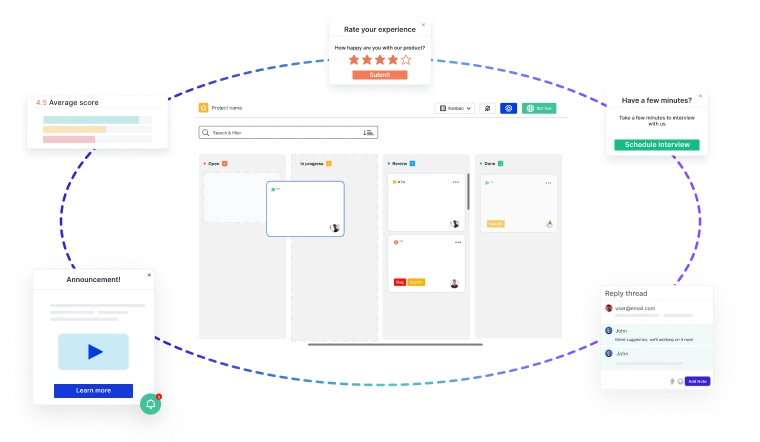You’re probably already aware that customer experience manager and customer support are important for digital companies.
However, SaaS, software, and e-commerce companies have a slightly different, additional challenge on their hands. Your potential customers can easily research and even test-drive all of their options before purchase. Sounds like a challenge to you? Then let’s jump in.
Quick tangent: if you need a more holistic approach to customer feedback, check out our ultimate guide to customer feedback straight away.
Ok, back to the article 😊! According to Entrepreneur, great customer support strengthens your company’s brand, opens doors for partnerships, and increases retention — which is 5 times more profitable than acquisition.
For software, e-commerce, and SaaS brands however, unlike in brick-and-mortar businesses, you must consider the entire customer journey in order to attract and retain customers.
That’s the job of a customer experience specialist.
In this article, you’ll discover the purpose of an independent cx manager responsibilities and evaluate whether your company needs one now.
The unique role of a customer experience manager
In e-commerce and software, the competition is always just a few finger-taps our mouse clicks away. Both software and e-commerce companies must work to build loyalty and trust even before prospects become customers. Otherwise, you risk customers churning out for something “easier.”
Accomplishing this requires special attention from the first brand impression all the way through purchase and usage. A customer experience specialist does just that. They assume responsibility for reading the market and connecting with customers through a positive experience with your online brand, start to finish.
Customer Support vs. Customer Experience Manager Responsibilities
According to a recent CX survey ran across 100+ digital companies, the multiple departments within a company would have customer experience-related activities at hand. And support is in the lead, meaning most companies still rely on them to move the needle for CX.
Interestingly, a surge of VoC (voice of customers) teams can be seen on the horizon. Especially in B2C companies, the strategy and ownership of customer experience clearly have a different value than support and operations. Hence 56% of the companies have established independent CX teams to tackle that.

What exactly are the CX manager’s responsibilities? Why do many companies expect the customer support team to step up to these functions?
Here’s a simple comparison:
| Customer Support | Customer Experience Manager |
Pre-purchase
– Answer questions about terms of sale
– Assist customers to understand the usage of the product | – Establish communication channels between the company and customers
– Remove obstacles for customers to fully experience the brand and product |
Purchase
– Support order placements or cancellations
– Resolve customer complaints
– Cancel or upgrade accounts | – Ensure customer satisfaction
– Build customer relationships |
Post-purchase
– Assist with refunds or exchanges |
– Analyze customer interaction data to optimize the customer experience
– Enhance customer loyalty |
As you can see, a customer experience manager’s responsibilities are more overarching than those of customer support.
Why SaaS and E-Commerce Need Customer Experience Managers
How can an e-commerce or software business know whether it needs a customer experience manager? Consider these signs:
Is your company having trouble…
…converting leads into customers?
…managing multiple communication channels?
…smoothly transitioning customers from marketing to sales, and sales to customer support?
…identifying why customers are churning?
…collecting customer feedback and analyzing data about customer usage?
…optimizing and measuring the value of customer experience?

If so, it may be time to hire a customer experience manager who can take ownership for overseeing and improving the entire customer journey.
Care for the entire Customer Journey
What is the customer journey? Different businesses label it differently. However, for the purpose of understanding how a customer experience manager operates, the main phases of the journey are the first impression, consideration, purchase, usage, and loyalty.
During the first impression phase, marketing creates “need generation” and a “trigger” to attract potential customers.
Then, customers consider the product and evaluate their options. E-commerce has a unique challenge here; whereas customers standing in a store are more likely to simply make a purchase, online customers can easily shop around. So it’s the customer experience manager to ensure a superior experience.
When a purchase is made, sales and marketing have done their job. But the work of retaining the customer in a competitive market isn’t over.
Tools for CX Specialists
Usersnap is a customer feedback tool to help measure customer satisfaction and collect qualitative feedback and enables advance collaboration and management capabilities to make the voice of customers actionable.
“Usersnap helped us shorten the customer support cycle and thus plays an important role in maintaining and improving the usability of our product.”
Joscha Feth, Canva
This article was brought to you by Usersnap – a customer feedback, screen recording, screenshot, and bug tracking tool for ever SaaS company. Try it out for free with your team now, sign up for a 15-day free trial.
Accelerate Issue Resolution with Visual Bug Reporting

Identify, capture, and resolve issues faster with screen recordings, screenshots, and contextual feedback—seamlessly integrated into your product development lifecycle.
And if you’re ready to try out a visual bug tracking and feedback solution, Usersnap offers a free trial. Sign up today or book a demo with our feedback specialists.